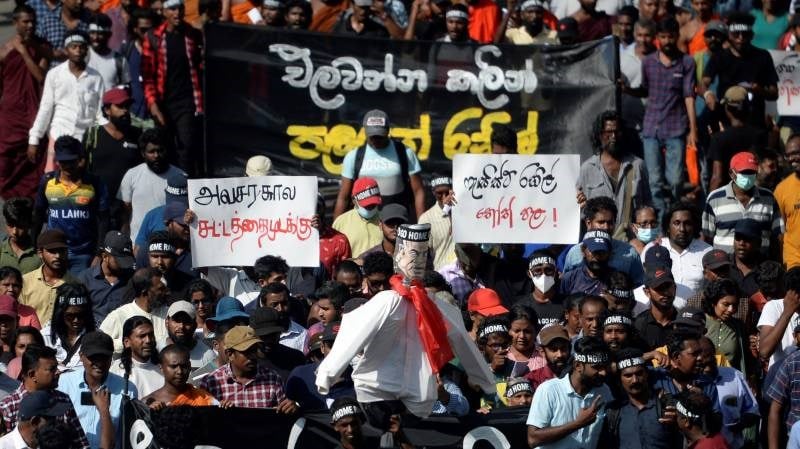Sri Lanka begins vote to replace fleeing president
Sri Lanka's parliament began voting Wednesday for a president to replace Gotabaya Rajapaksa.
-

Sri Lanka begins voting to replace the fleeing president.
Sri Lanka's parliament began voting on Wednesday for a president to succeed Gotabaya Rajapaksa, who fled abroad after his palace was stormed by angry protesters and now faces a crackdown from his likely successor.
One by one, legislators entered ballot booths set up on the chamber floor to choose between three candidates to lead the country in crisis.
"Members are reminded that taking photographs of ballot papers or displaying them to others is an offense," parliamentary secretary-general Dhammika Dasanayake told them. Previous elections have been marred by allegations of corruption and vote-buying.
The winner will take over a bankrupt country in IMF bailout talks, with its 22 million people facing severe food, fuel, and medicine shortages.
Hundreds of heavily armed troops and police stood guard outside the parliament, but there were no signs of protesters.
Analysts believe Ranil Wickremesinghe, a six-time former prime minister who became acting president after his predecessor resigned, is the frontrunner, but protesters see him as a Rajapaksa ally.
Read next: Sri Lanka: Millions of rupees found in Presidential palace
Months of protests over an unprecedented economic crisis culminated in Rajapaksa resigning from Singapore last week, just days after troops rescued him from his besieged compound.
After his brothers resigned as premier and finance minister earlier this year, his departure wounds a once-powerful ruling clan that has dominated Sri Lankan politics for the majority of the past two decades.
Wickremesinghe for president?
Rajapaksa's SLPP, the largest bloc in the 225-member parliament, is backing Wickremesinghe, 73.
As acting president, Wickremesinghe has declared a state of emergency, giving police and security forces broad powers, and he recently ordered troops to evict protesters from state buildings they had occupied.
An opposition MP said Wickremesinghe's tough stance against demonstrators was popular among MPs who had faced mob violence, and that most SLPP legislators would support him. "Ranil is emerging as the law-and-order candidate," Tamil MP Dharmalingam Sithadthan told AFP ahead of the ballot.
Despite his own party securing only one seat in the August 2020 elections, political analyst Kusal Perera agreed Wickremesinghe had a "slight advantage."
Read next: Sri Lankan opposition leader withdraws presidential candidacy
"Ranil has regained the acceptance of the urban middle classes by restoring some of the supplies like gas and he has already cleared government buildings showing his firmness," Perera said.
As lobbying intensified ahead of the vote, the contest appeared to be close. Two smaller parties backed Wickremesinghe's main challenger, Dullas Alahapperuma, while a Tamil party with two votes switched sides to back Wickremesinghe.
Observers believe Wickremesinghe will crack down hard if he wins and demonstrators take to the streets, accusing him of protecting the Rajapaksas' interests.
Former President Mahinda Rajapaksa, the deposed Gotabaya's elder brother and the leader of the clan that has dominated Sri Lankan politics for years, is still in the country, according to party sources, and is pressuring SLPP legislators to back Wickremesinghe.

 3 Min Read
3 Min Read








